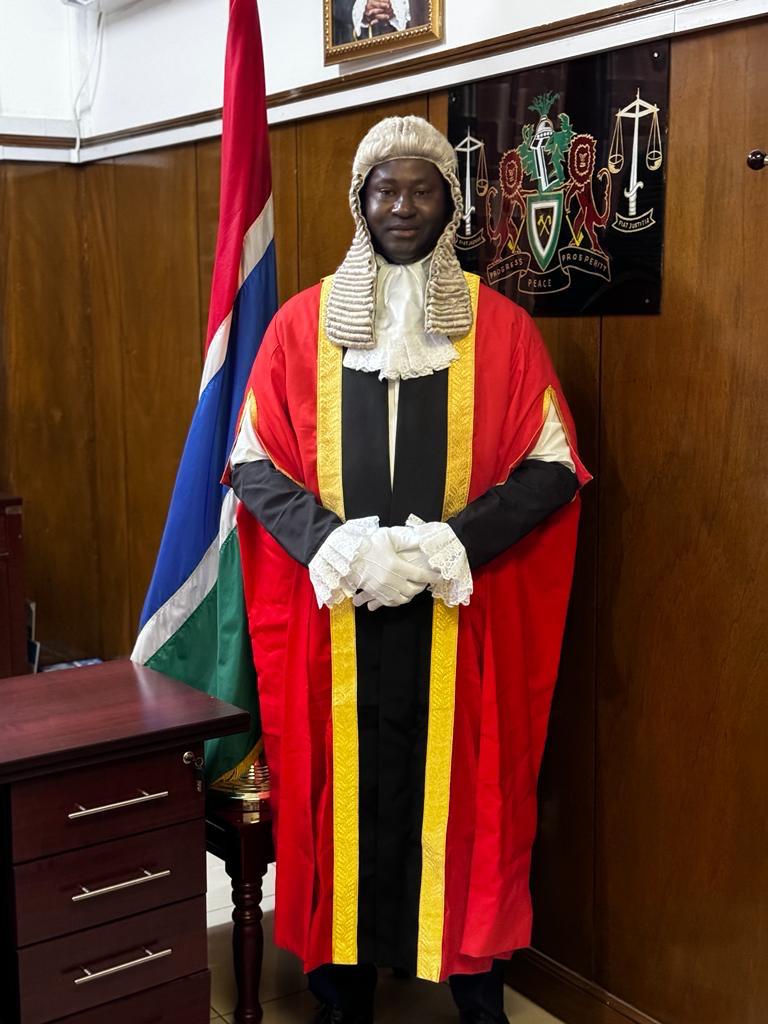
The High Court in Banjul has sentenced Kemo Jobe, an 18-year-old carpenter from Latrikunda Sabiji, to ten years in prison after finding him guilty of robbery with violence.
The judgment, delivered by Justice Ebrima Jaiteh, followed a trial in which the prosecution relied on eyewitness accounts and the recovery of the stolen mobile phone in Jobe’s possession. The robbery occurred on July 12, 2022, at the Tallinding Buffer Zone, where the victim, Lamin Touray, was attacked and robbed.
The indictment, filed on October 25, 2022, charged Jobe with one count of robbery with violence under Section 272 of the Criminal Code, which is punishable by life imprisonment under Section 273(2). He pleaded not guilty to the charge.
According to court records, the incident occurred at a party held at Semega Janneh Hall. The victim, 17-year-old Lamin Touray, testified that Jobe accused him and his friends of taking his younger brother’s missing hat and demanded to search them. When Touray resisted handing over his phone, Jobe allegedly brandished a bottle, threatened him, and, with the help of his friends, forcefully took his Huawei mobile phone before fleeing the scene.
Touray reported the matter to the Bundung Police Station and later identified Jobe. The phone, which still contained Touray’s SIM card, was recovered from Jobe by police.
During the trial, Police Officer Alagie Jallow (PW1) from Bundung Police Station testified that Jobe confessed during interrogation to taking the phone. He said that an earlier suspect, Alieu Jobe, who admitted being present at the scene, identified Kemo Jobe as the person responsible and led officers to his arrest. A search conducted on Jobe at the time of arrest led to the recovery of the stolen phone from his pocket.
The court also admitted Jobe’s cautionary and voluntary statements as evidence, along with the stolen mobile phone, which was tendered as Exhibit P4.
Under cross-examination, Officer Jallow confirmed that no broken bottle was found on Jobe, but the mobile phone was recovered, and Jobe did not deny taking it. Touray, during his testimony, added that Jobe was carrying a small knife at the time of the robbery.
In his defence, Jobe claimed he was at his father’s workplace in Latrikunda Sabiji at the time of the incident and denied being at the scene or knowing Lamin Touray. He also alleged that a boy in handcuffs wrongly identified him during a police encounter.
However, Justice Jaiteh found Jobe’s alibi unconvincing, noting that it lacked corroboration and was not raised at the earliest opportunity—contrary to legal expectations set by precedents such as Yankuba Touray v. The State. He emphasized that an alibi must be timely and detailed to allow police to investigate its credibility.
“Defence of alibi is not made at large, but at the earliest opportunity, with verifiable particulars to afford the police the opportunity of proper investigation of same for trial.”
In his judgment, Justice Jaiteh affirmed the prosecution’s burden of proof and found Lamin Touray to be a credible eyewitness. He highlighted the doctrine of recent possession, noting that Jobe had failed to offer a reasonable explanation for possessing the stolen phone, which still contained Touray’s SIM card.
“In light of this evidence, I assert that the prosecution has provided sufficient proof to establish the accused’s involvement at the crime scene,” Justice Jaiteh stated in his judgment. “The combination of Pw2’s identification, the recent possession doctrine, and the compelling evidence presented in Exhibit P4 firmly establish the guilt of the accused in this matter.”
Following the guilty verdict, Defence Counsel C. U. Uduma pleaded for leniency on behalf of Kemo Jobe, describing him as a young, first-time offender who supports his parents and has demonstrated remorse for his actions. Counsel Uduma urged the court to temper justice with mercy, taking into account the mitigating circumstances.
In delivering the sentence, Justice Ebrima Jaiteh acknowledged the gravity of the offence and the growing prevalence of violent crime. However, he also took into consideration Jobe’s age and his clean criminal record. Justice Jaiteh referenced the sentencing principles outlined in Nyabally v. The State, which provide guidance on the treatment of first-time offenders, balancing justice with rehabilitation.
“Thus, if I am minded to temper justice with mercy, the convict Kemo Jobe must be taught a lesson to send a message to the public that acts of criminality will not be tolerated by this court,” Justice Jaiteh declared before delivering the sentence.
Justice Ebrima Jaiteh sentenced Kemo Jobe to ten (10) years in prison, with the term to be calculated from the date of his initial arrest. The court also informed Jobe of his right to appeal the conviction and sentence.

